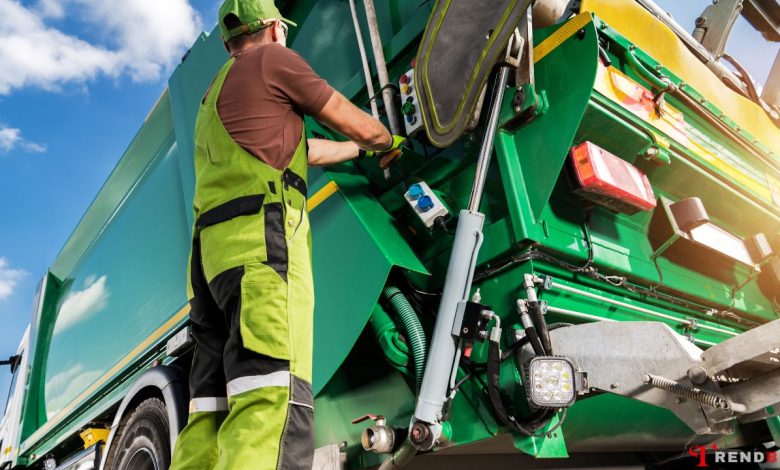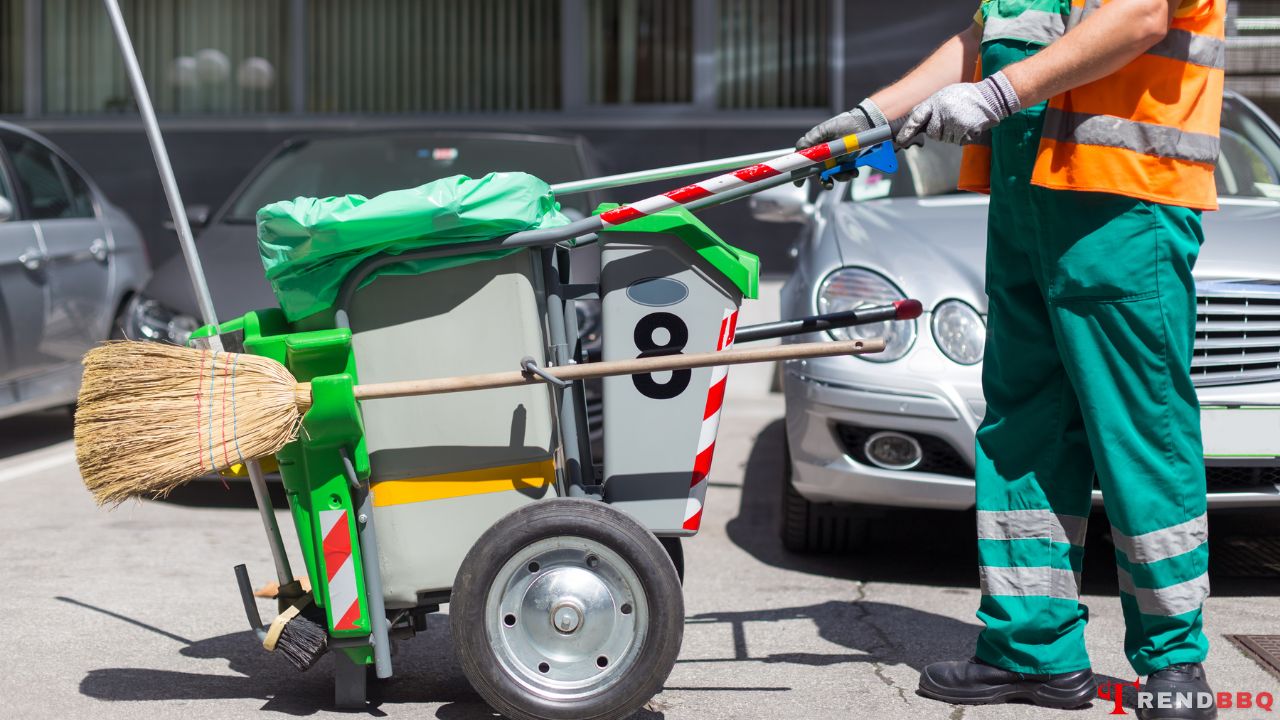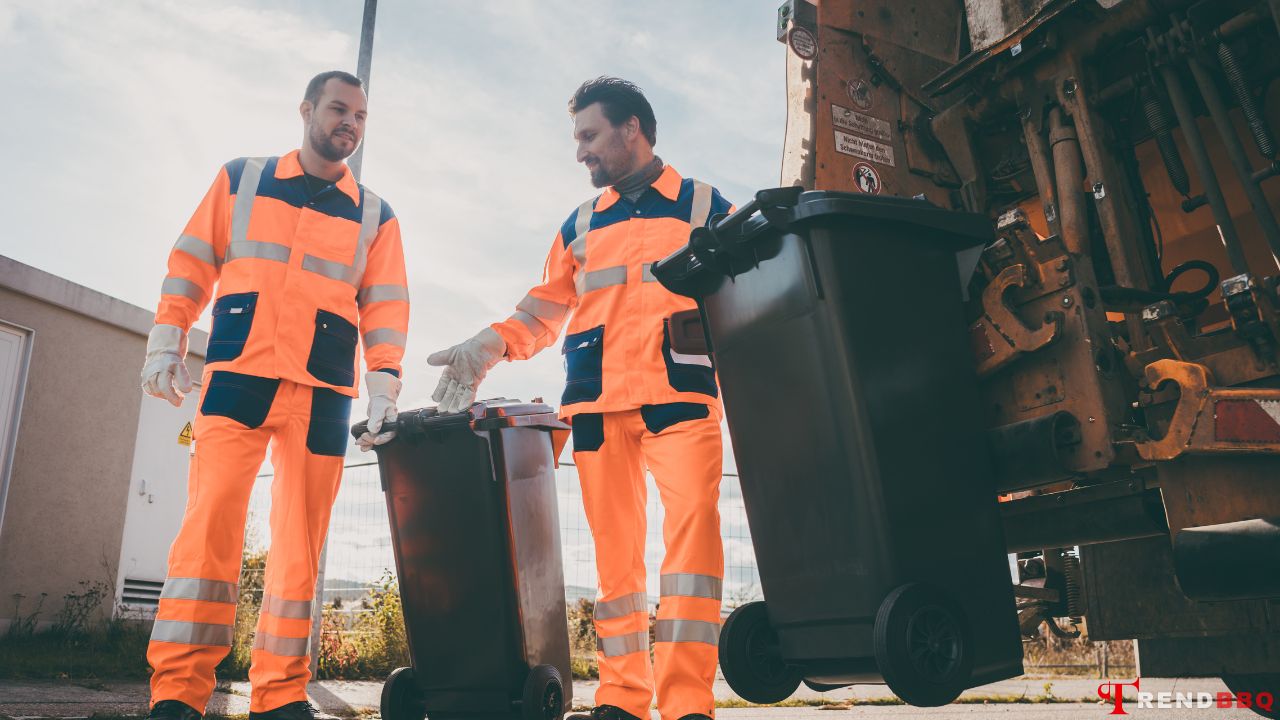
Average garbage man salary in 2023
A garbage collector, also referred to as a refuse or rubbish collector, is responsible for collecting and transporting waste to either a landfill or a recycling center. These professionals typically find employment with waste management companies or local councils. If you are interested in pursuing a career as a rubbish collector, it’s essential to understand the steps involved in becoming one.
In this article, Trendbbq.com will explain the role of a rubbish collector, outline the path to becoming one, garbage man salary, explore potential career progression opportunities for you to consider.
Table of Contents,
1. What is a rubbish or garbage collector?
A rubbish or garbage collector, also known as a refuse collector, waste collector, or sanitation worker, is an essential worker responsible for collecting and disposing of waste materials from residential, commercial, and public areas. Their primary duty is to collect garbage, recyclable materials, and other waste products from designated bins or containers.
Rubbish collectors typically work for waste management companies, local municipalities, or sanitation departments. They follow specific routes and schedules to collect waste from homes, businesses, and public spaces, ensuring that waste is safely and properly disposed of or recycled.
These workers play a crucial role in maintaining public health and cleanliness by removing waste and preventing the accumulation of garbage in populated areas. They may operate garbage trucks or specialized collection vehicles to load and transport the collected waste to disposal sites, landfills, or recycling centers.
Rubbish collectors must adhere to safety guidelines and regulations while handling waste, as some materials may be hazardous. They may also be involved in cleaning and maintaining collection equipment, ensuring it functions properly.
Overall, rubbish collectors play a vital role in keeping communities clean, safe, and environmentally responsible by managing waste collection and disposal efficiently.

2. How to become a rubbish collector
Steps to Pursue a Career as a Rubbish or Garbage Collector:
Obtain the Appropriate License
Depending on the specific employer or job position, securing a relevant license is typically the first requirement for becoming a rubbish collector. For roles that involve driving waste trucks, a valid driver’s license is often the minimum necessity. In cases where waste truck driving is involved, you may need a vehicle license suitable for the specific truck type. For instance, rubbish truck drivers might require a license to operate a heavy-rigid or medium-rigid vehicle.
Explore Traineeship Opportunitie
Some local councils or organizations offer traineeships in waste collection. These traineeships generally span six months to a year and equip individuals with practical skills essential for the role. Through these programs, you can gain proficiency in various tasks, including navigating routes efficiently, handling waste compaction processes, and ensuring safety compliance.
Apply for a Refuse-Collecting Position
Upon obtaining the required licensing and relevant training, you can actively apply for rubbish-collecting job openings. Opportunities for employment may arise within local councils or private waste collection companies. Engaging in a job application process will allow you to showcase your qualifications and secure a position in this field.
Embracing a career as a rubbish or garbage collector requires dedication, diligence, and a commitment to ensuring efficient waste management while contributing to the cleanliness and well-being of communities.
3. Typical duties of a rubbish collector
As a rubbish or garbage collector, your duties and responsibilities encompass a range of essential tasks, ensuring effective waste management and maintaining a clean environment. Some of the typical responsibilities in this role include:
- Vehicle Maintenance: Taking care of waste collection vehicles by conducting regular maintenance checks and addressing any mechanical issues to ensure they operate smoothly.
- Cleaning Vehicles: Maintaining the cleanliness of waste collection vehicles to ensure hygienic and efficient operations.
- Servicing Public Bins and Cleaning Them: Regularly attending to public bins, emptying them, and cleaning to uphold sanitation standards.
- Collecting Cardboard Waste: Gathering and disposing of cardboard waste from residential and commercial areas, contributing to recycling efforts.
- Gathering General Waste from Residential Areas: Collecting general waste from residential neighborhoods and ensuring timely and proper disposal.
- Collecting Building Rubbish from Large Skip Bins: Handling the collection of construction and building waste from large skip bins, facilitating the proper removal of debris.
- Ensuring Workplace Safety when Navigating Streets and Suburbs: Adhering to safety protocols and guidelines while driving through streets and suburbs to avoid accidents and ensure the well-being of the public.
- Disposing of Waste at Collection Centers and Landfills: Properly transporting collected waste to designated collection centers or landfills for appropriate disposal.
- Handling Hazardous Materials: Exercising caution and following safety protocols when dealing with hazardous waste materials to mitigate potential risks.
- Collaborating with Other Rubbish Collectors: Working as a team with fellow rubbish collectors to efficiently cover designated routes and achieve waste collection targets.
- Operating Recycling Trucks and Rubbish Collection Trucks: Proficiently operating specialized trucks used for recycling and rubbish collection, ensuring efficient waste segregation and disposal.
- Lifting Heavy Objects, such as Bins or Rubbish Bags: Physically handling and lifting heavy objects, such as bins or rubbish bags, with proper lifting techniques and equipment to prevent injuries.

4. Average garbage man salary
Please note that the provided salary figures are based on data from Indeed Salaries at the time of writing and are subject to variation based on individual factors such as experience, educational background, and location.
The national average garbage man salary stands at $67,755 per year. However, actual salaries can differ depending on the region and level of experience. States and cities with higher demand for waste collectors may offer more competitive compensation packages.
Here are the average garbage man salary in various cities:
- Malvern, VIC: $76,506 per year
- Ballarat, VIC: $75,776 per year
- Broadmeadows, VIC: $68,702 per year
- Perth, WA: $68,530 per year
- Hobart, TAS: $54,784 per year
These figures demonstrate the salary variations that can occur across different locations within the country. It’s essential to consider regional differences and other factors when evaluating potential earnings as a rubbish or garbage collector.
5. Career progression
Aspiring rubbish collectors seeking employment in waste-management roles must acquire the necessary skills and industry knowledge. Many waste collection companies and local councils appoint waste managers to supervise rubbish collection operations, encompassing tasks like vehicle maintenance, employee scheduling, route management, and waste disposal.
A managerial position in waste management may offer a higher salary compared to frontline rubbish collector roles. The national average salary for a waste manager stands at $124,593 per year. To qualify for a waste manager position, individuals may need to possess substantial work experience in the field or pursue a formal qualification, such as a diploma in waste management.
Earning such a qualification or gaining relevant experience can pave the way to securing a rewarding managerial role, offering increased responsibilities and enhanced earning potential in the dynamic waste management sector.
6. Rubbish or garbage collector skills
As a rubbish collector, developing certain skills can greatly assist you in fulfilling your responsibilities effectively:
Customer Service
Interacting with people regularly, especially if employed by a city council, requires strong customer service skills. Being friendly and professional can improve public cooperation and positively represent the council. Practicing a positive mindset and treating customers with respect can enhance your customer service abilities.
Teamwork
Working as part of a team is common for rubbish collectors, typically including a driver and one to two other team members. Efficiently and safely collecting residential and commercial bins requires seamless teamwork. Improving communication habits, like active listening, and displaying considerate behavior toward team members can enhance teamwork.
Physical Fitness
As a refuse collector, your responsibilities may involve considerable physical activity, including walking long distances or lifting heavy rubbish bags and bins. Maintaining physical fitness through a healthy diet and regular exercise can support your job performance.
Time Management
Managing time effectively is vital for completing routes on schedule. With multiple locations and specific time requirements, efficient time management ensures professionalism and effectiveness in your tasks. Scheduling activities and setting specific timeframes can improve your time management skills.
Awareness
Working around pedestrians and vehicles demands heightened awareness to ensure safety. Being aware of your surroundings enables you to perform your role securely and identify hazardous objects, like batteries or gas canisters, that must be handled appropriately. Sufficient rest can aid in maintaining focus and concentration, enhancing your overall awareness.
By honing these skills, you can excel as a rubbish collector, navigating your responsibilities with competence and contributing positively to waste management and public service.



Reading your article helped me a lot and I agree with you. But I still have some doubts, can you clarify for me? I’ll keep an eye out for your answers.
Thanks for sharing. I read many of your blog posts, cool, your blog is very good. https://accounts.binance.info/kz/register-person?ref=K8NFKJBQ
Can you be more specific about the content of your article? After reading it, I still have some doubts. Hope you can help me. https://accounts.binance.info/register-person?ref=IXBIAFVY